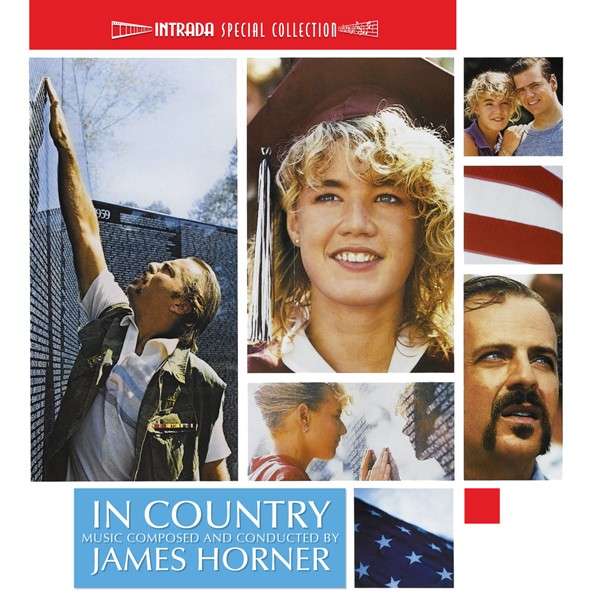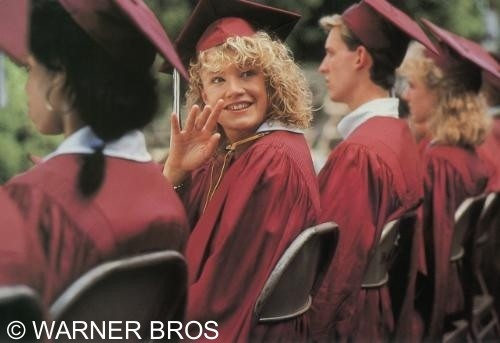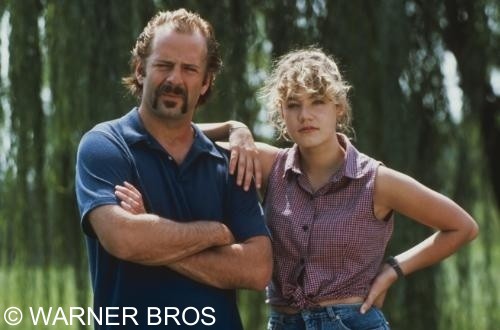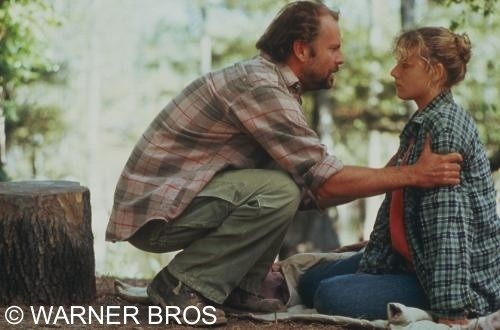
Many thanks to Regina Fake, for giving us the opportunity to write this article in the best possible conditions.
“There is no such thing as an absolute masterpiece. For my part, I like Cocoon, In Country and The Spitfire Grill very much indeed.” James Horner – 1998.
 We can never be sufficiently grateful to Douglass Fake and Roger Feigelson for finally releasing such a favourite Horner score, for which a place in our CD shelves had been reserved for a long time. For two decades we were certain that the brilliant music of Norman Jewison’s film deserved an album release. Intrada’s two craftsmen end this long wait and at the same time warm up our hearts frozen by the winter.
We can never be sufficiently grateful to Douglass Fake and Roger Feigelson for finally releasing such a favourite Horner score, for which a place in our CD shelves had been reserved for a long time. For two decades we were certain that the brilliant music of Norman Jewison’s film deserved an album release. Intrada’s two craftsmen end this long wait and at the same time warm up our hearts frozen by the winter.
In Country is about a veteran of war (Bruce Willis) back from Vietnam, who has difficulties in looking after the daughter of his brother, who died during the war. On a similar theme to another film released that same year, Born on the 4th of July (Oliver Stone), or of The War At Home (Emilio Esteves, 1996), James Horner brings a new and more intimate version of the return to life. The latter film has something in common with the music of In Country: Basil Poledouris chose an intimate and melodic score to portray the characters, much like James Horner. Famous for frequently changing composers, Norman Jewison chose the composer, who had already been imprinting film music with his intimate vision by the end of the eighties.
This prominent side of his work fully flourishes here. Apart from the introduction and the conclusion, which is performed with a restraint lyricism by and orchestra, In Country focuses on a small ensemble of instruments. The recording sessions were held on two occasions: at the end of March 1989 at the CBS Radford Studios and in mid-April with the orchestra at the Burbank Studios. Just like his scores composed the same year for Dad and Field Of Dreams, James Horner gives way to the subject so as to better transcend it, while respecting the cyclic aspect of his work. Each of his scores is unique and is a piece of a global artistic scheme.
[divider]In Beauty[/divider]
 The first contact with In Country leaves no one indifferent; an enthralling first look, difficult to forget. This music is simply beautiful. And that is mostly due to the fine orchestrations by James Horner and Greig McRitchie, and to a recording able to catch all its nuances. Nothing can replace the dimension of an album release to fully highlight a film score, as it has its own life beyond the screen.
The first contact with In Country leaves no one indifferent; an enthralling first look, difficult to forget. This music is simply beautiful. And that is mostly due to the fine orchestrations by James Horner and Greig McRitchie, and to a recording able to catch all its nuances. Nothing can replace the dimension of an album release to fully highlight a film score, as it has its own life beyond the screen.
A trumpet, a pinch of percussion, and then a subtle arpeggio of harp introducing the strings… The opening of the album encapsulates the very elegance of the orchestrations and of the meticulous recording. James Horner gave In Country a personal and refined score (restrained like the bassoon at 2:29, and the clarinet and the oboe at 2:44 in Faraway Thoughts) and we understand better why the composer loves this music, because just like Cocoon, The Spitfire Grill or Iris, it offers a subtlety likely to bring out the audience’s emotions. Music that simply sounds like him.
[divider]In the past, in the future[/divider]
In Country is a cornerstone in James Horner’s career. It groups part of scores written in the eighties and announces colors, which will be delicately spread in numerous future scores.
The theme opening the album (Distant Memories), with its strings accompanied by drums dear to the composer’s heart (Uncommon Valor, 1983, Aliens, 1986), creates a bridge between the marches of Glory (1989) and the elegiac hymns of Courage Under Fire (1996). The trumpet solos remind us of the horn solo of Testament (1983) and of the patriotism of Apollo 13 (1995). In Country summarizes the maestro's approach to scoring the subject of war, yet stands out by not sounding predictably or traditionally war-like as one would expect.
 The second, more lyrical theme, transpires emotion and shall be exploited in Legends Of The Fall (1994) and The Four Feathers (2002), but as its melody structure is based on a Celtic figure, it shall mostly been developed in The Devil’s Own (1996). It brings that romanesque and human feeling, which is not limited to illustration of the images and the story, but is an active part of it. It supports the film and the characters’ feelings with strength and delicacy.
The second, more lyrical theme, transpires emotion and shall be exploited in Legends Of The Fall (1994) and The Four Feathers (2002), but as its melody structure is based on a Celtic figure, it shall mostly been developed in The Devil’s Own (1996). It brings that romanesque and human feeling, which is not limited to illustration of the images and the story, but is an active part of it. It supports the film and the characters’ feelings with strength and delicacy.
In Faraway Thoughts and Three Generations, the piano wistfully recalls Field Of Dreams (1989) and To Gillian (1996). Tommy Todesco’s guitar, already heard in Field Of Dreams, confirms this impression, while displaying feelings experienced in Cocoon (1985) and in The Journey Of Natty Gann (1985). This peaceful nature of the score sustains further with The Letter, opening with soft strings, which shall form the romantic pattern of Bicentennial Man (1999).
Then there is the anguishing digression of the cue In Country, an electronic approach that James Horner will use throughout the next two decades. It contains the synthetic origins of the Revenge cues heard in Legends Of The Fall and Braveheart, the pulse of action cues in Patriot Games and Devil’s Own, the vicious exoticism of Apocalypto and Avatar, and of course the painful fury of Kazu Matsui’s shakuhachi, which will burst in Tristan’s theme in Legends Of The Fall. In the next cue, Emmett, distress and injuries weaken thanks to the soothing softness of the woodwinds and guitar – playing what will become the notes of Swing Kids (1993) or of The Boys In The Striped Pajamas (2007), both which evoke war under its most innocent form.
 The finale of the score (Fallen Friends), gathers all afore-mentioned ideas and compositional approaches in one near 11-minute piece. It is the melodic and orchestral jewel of the album, with pastel colors that fill us so tenderly and move us definitely. It perpetuates Horner’s more and more frequent habit to score epilogues through long cues, like those of Legends Of The Fall, Braveheart, Courage Under Fire or The Pelican Brief.
The finale of the score (Fallen Friends), gathers all afore-mentioned ideas and compositional approaches in one near 11-minute piece. It is the melodic and orchestral jewel of the album, with pastel colors that fill us so tenderly and move us definitely. It perpetuates Horner’s more and more frequent habit to score epilogues through long cues, like those of Legends Of The Fall, Braveheart, Courage Under Fire or The Pelican Brief.
The extras offer interesting and welcome variations, showing how the composer can shape/form his melodies according to the context of the scenes, as short they may be, yet also enhance the impression of the music as a whole.
[divider]In fine[/divider]
All that said, In Country is a score that is both influenced and an influence. It illustrates the composer’s stylistic maturity that he has forged over the first part of his career and that is reflected in other symphonic jewels of the same period, namely The Land Before Time or Willow. This score is also the result of ten years of experience writing for cinema, a demonstration of evolution in his orchestrations compared to the style developed in the eighties, but also a step forward as this album directly leads us in what will be the composer’s music in the mid-nineties. To rediscover such a work twenty-four years after its creation is a gift, a treasure chest and true pleasure to explore thoroughly. In Country or the missing and essential link of emotion by James Horner.
1 – Interview with James Horner, by Didier Leprêtre, in Dreams to Dream…s, 1998.
In memory of G.L.




